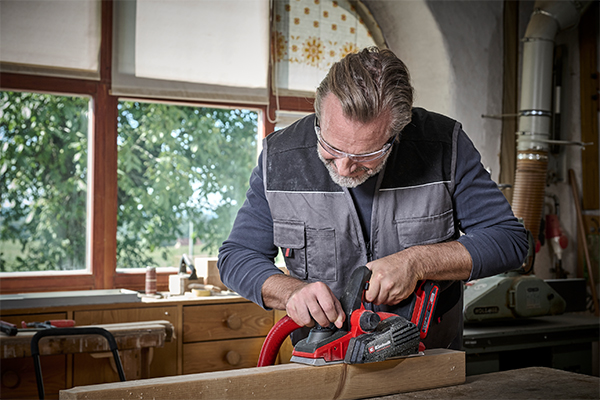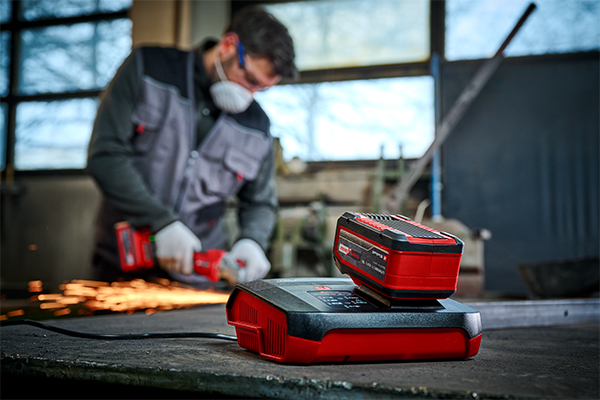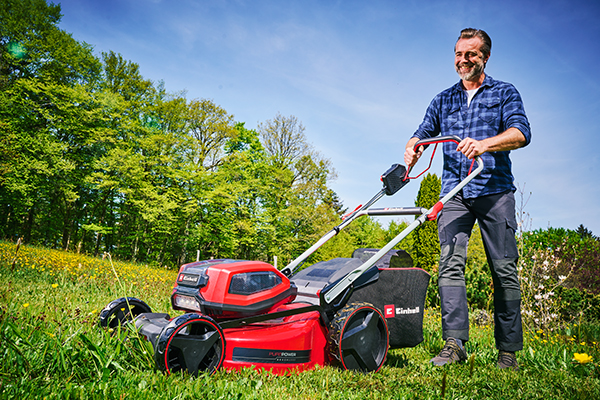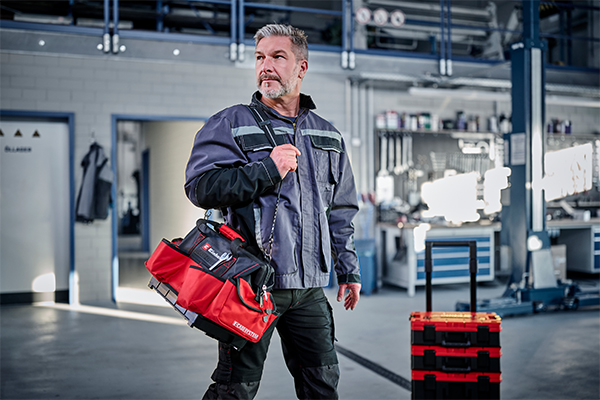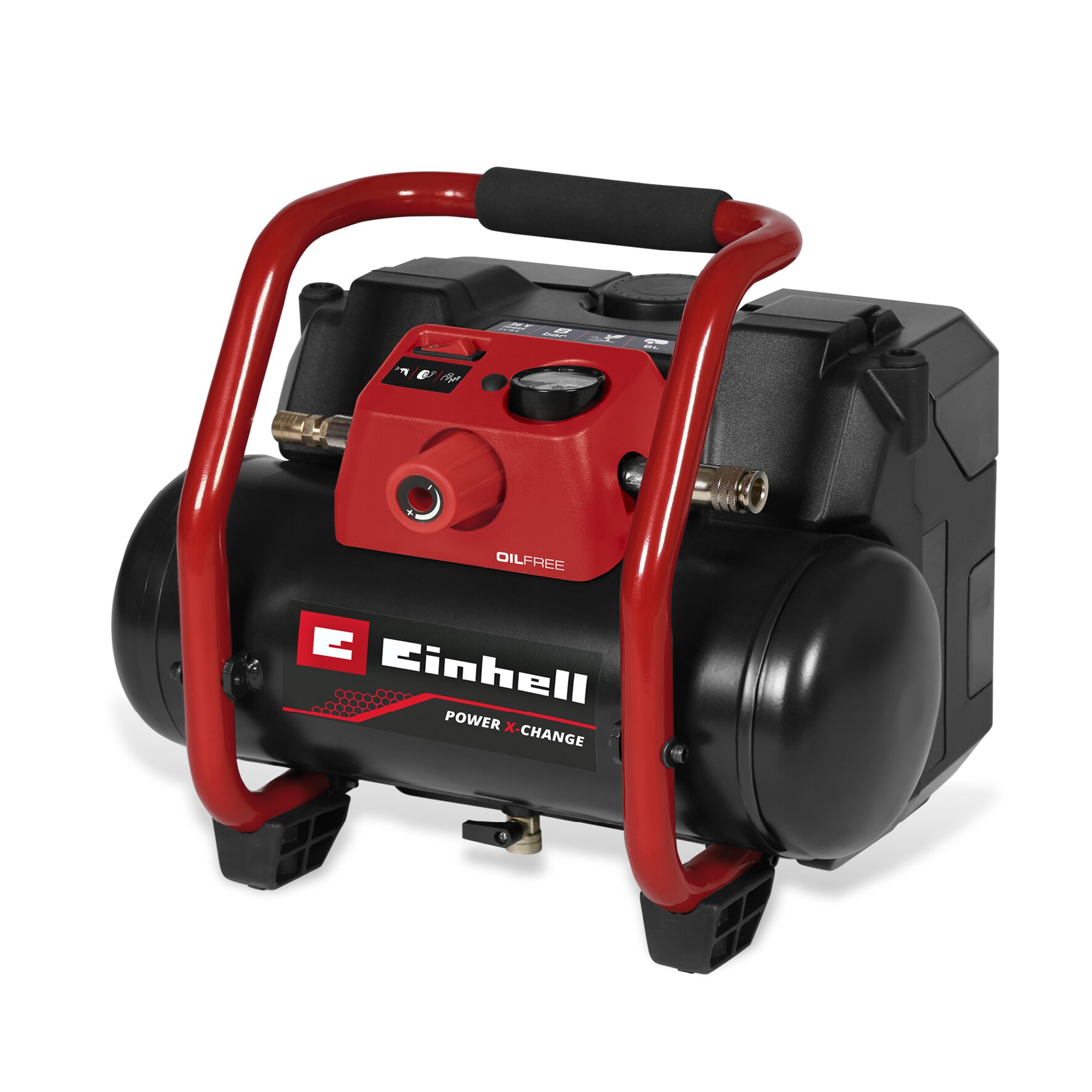Under Pressure – Compressors and Their Versatile Applications
Versatile, Powerful, and Flexible in Use: Compressors are True Multi-Talents for Workshop, Home, and Garden. Depending on the accessories you equip your compressor with, you can use it for various tasks: Whether grinding, stapling, screwing, painting, or simply inflating and checking the pressure of car tires – a compressed air compressor makes it possible. In the Einhell range, you will find a wide selection of powerful devices that vary in size, power, and even drive type. Can't decide? In our comparison, we show you the differences and advantages of the various types of compressors.

Here’s Where Compressors Are Used
Compressed air can be used for a wide range of tasks, making the applications of a compressor quite diverse. We've put together an overview for you, showing what a compressor can accomplish with the right accessories:

Inflating / Checking Pressure
Whether it’s bicycle tires, car tires, air mattresses, or balls – with the right tire inflator, all of these tasks are a breeze. Most tire inflators come equipped with a pressure gauge for monitoring air pressure. Additionally, there are various nozzles available for inflating balls or paddling pools.
Blowing Out
Blowing out tools, workpieces, and air filters, as well as hard-to-reach corners in the workshop, is extremely useful. A blow gun allows you to reach areas that are inaccessible with a vacuum cleaner hose. Additionally, there are blow guns with extra-long nozzles for even more precise cleaning.


Sanding
Both orbital and straight grinders can be operated excellently with compressed air. Compared to electrically powered devices, they are generally lighter and, due to their simple mechanics, also more durable.
Screwing
Pneumatic impact wrenches are particularly common in the automotive sector. Why? Air-powered impact wrenches are significantly more overload-resistant than electric ones and don’t tend to overheat.


Stapling / Nailing
A staple in the DIY workshop: the pneumatic stapler. Stapling, pinning, and nailing are essential for woodworking and crafting, saving time and effort. Baseboards or molding can be perfectly pinned without the nails being too visible. Upholstered furniture can be reupholstered with staples. Parts to be glued can be fixed with pins, allowing them to be easily screwed or held in place with a clamp without shifting.
Painting
Professional painters prefer to work with compressed air. This is mainly because air-powered paint spray guns are generally lighter than most electric models.


Sandblasting
Similar to a paint sprayer, a blasting medium is propelled with a sand spray gun onto the workpiece by air pressure. This is the most thorough method for preparing workpieces for painting.
Drilling / Chiseling
These tasks can be done excellently with electric tools as well. Nevertheless, pneumatic chisel hammers and screwdrivers also have their justification here because, depending on the compressor, they are more powerful due to the use of compressed air. With the help of various chisels, demolition work can be carried out throughout the house.

How to Find the Right Compressor
What Will the Device Be Used For?
Before deciding on a specific air compressor, you should clearly define what you need the device for. If you're facing tasks that require a lot of power – such as working with a chisel hammer or impact wrench – a corded compressor with a pressure tank is suitable for you. And remember: the more time-intensive the tasks, the larger the tank volume should be. On the other hand, if you’re looking for a mobile compressor primarily for inflating tires or checking pressure, a compressor without a tank will suffice.
Our PRESSITO cordless or hybrid models differ from other compressors in another aspect: they are not equipped with a quick coupling for connecting various pneumatic tools. The PRESSITO compressors are more like mobile helpers for high and low-pressure pumping. Various adapters for wheels, balls, air mattresses, etc., are already included.

What Accessories Will Be Used With It?
Not every compressor is compatible with every accessory, as different applications require different air volumes or output capacities. To help you navigate our range more easily, we've created a graphic for each compressor, allowing you to see at a glance which applications each model is suitable for:

This way, you can see at a glance whether the accessory you’ve selected is compatible with your new compressor based on its specific air requirements.
Compressors Compared: These Are the Biggest Differences
Compressors differ in many ways. For example, with us, you will find models with or without a tank, with oil lubrication or oil-free, battery-powered or corded, and finally, our silent models, the so-called whisper compressors. To help you find out which compressor best suits your needs, we explain the specific differences.
Loud or Quiet: Working with Whisper Compressors
Compressors generate significant pressure – and they're not exactly quiet. Especially during extended work, such as with pneumatic tools, wearing hearing protection is recommended, as conventional air compressors can reach noise levels of up to 97 dB (LwA). Human hearing can be damaged at levels starting from 85 dB. Depending on the accessory being used, the noise level can increase. For example, renovation work with a pneumatic chisel hammer can get very loud, making hearing protection essential for such tasks.
Things get quieter with the Einhell whisper compressors. These models are identified by the “Silent” label in their name. Thanks to their special design, the Silent compressors produce significantly lower noise levels, reaching up to 57 dB (LpA), making them much quieter than other models. For comparison: while a regular compressor can be as loud as 78 dB (LpA) – about as loud as a washing machine during its spin cycle – the quiet compressors only reach around 55 dB (LpA), which is comparable to a television at room volume.
Different Drive Types for Various Work Locations
Whether with or without a power connection: depending on where you need to work, you’ll need the right compressor. Each type of drive offers its own advantages:

Cordless Compressors
Without the need for a power outlet or tangled cables, Einhell cordless compressors offer flexible working options. Paired with a Power X-Change battery, they can be used wherever they are needed. Since these battery-powered models are ideal for mobile use, they tend to be compact and come equipped with a convenient carrying handle.
Hybrid Compressors
The Einhell Hybrid Compressor PRESSITO combines the best of both worlds, merging the advantages of cordless battery power and mains operation. This compact, portable compressor can be powered either by a cable or a Power X-Change battery. Thanks to the extensive accessories, including various adapters and hoses for low and high-pressure pumping, this small compressor is also perfect as a mobile companion.


Corded Compressors
Continuous power without interruptions is no problem with corded models. If there’s a power outlet available where you’re using your compressor, you can opt for a traditional compressor with a power cord. These models are especially well-suited for long, intensive tasks.
Oil-Free vs. Oil-Lubricated Models
Compressor models can also be divided into oil-free and oil-lubricated versions. The difference is quite simple: in oil-lubricated compressors, the moving parts are lubricated to prevent overheating during heavy-duty use. This makes oil-lubricated air compressors highly durable, well-suited for continuous operation, and extremely powerful. They are recommended for use with mechanical pneumatic tools such as impact wrenches or chisel hammers.
Oil-free compressors, on the other hand, offer their own set of advantages: they are generally lighter and more portable than oil-lubricated models. Additionally, aside from draining the condensate, they require no further maintenance, eliminating the need for used oil disposal, making oil-free air compressors cleaner and more environmentally friendly. Without oil, these devices also have no issues starting in low temperatures – they operate reliably in any weather. Due to the lack of lubrication, oil-free compressors are better suited for less demanding tasks, such as pure air work with accessories like tire inflators, blow guns, sandblasting, or paint spray guns. However, if mechanical pneumatic tools are still to be used, it is advisable to install an oiler between the compressor and the tool.

Air Reserves: With or Without a Tank?
In the Einhell range, you'll also find compressors with and without a tank. When working with pneumatic tools, more pressure and air volume are generally needed than the compressor can provide on its own. A pressure tank solves this problem by storing the necessary air. So, if you plan to tackle intensive, endurance-demanding tasks with your compressor, you should opt for a model with a tank. In the Einhell line-up, you can find models with a tank volume of up to 90 litres. On the other hand, if you need a handy compressor for occasional tasks like inflating car tires, balls, or air mattresses, a model without a tank, such as the PRESSITO or a suitcase compressor, would be suitable.

Conclusion: The Right Compressor for Every Task
The selection of compressors is vast. Depending on the tasks you want to tackle at home, models with a large tank or without, oil-lubricated or oil-free versions, larger corded or smaller cordless compressors might be the best fit. Just as the applications for air compressors are diverse, so are the various models available. There’s bound to be the right device for everyone!

